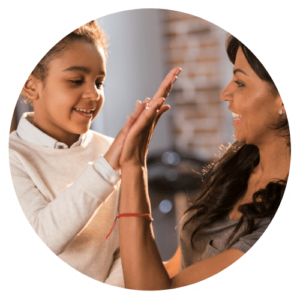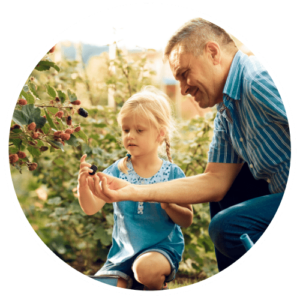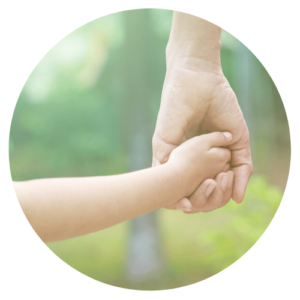Developmental Asset Categories
External Assets: Support | Empowerment | Boundaries & Expectations | Constructive Use of Time
Internal Assets: Commitment to Learning | Positive Values | Social Competencies | Positive Identity
External Assets: Support | Empowerment | Boundaries & Expectations | Constructive Use of Time
Internal Assets: Commitment to Learning | Positive Values | Social Competencies | Positive Identity
Feeling valued and appreciated is important to all of us. For young people, this means feeling safe and believing they’re liked and respected. These feelings can go a long way toward empowering children and youth. Providing opportunities and recognizing accomplishments helps young people build self-esteem. This in turn, gives them the confidence to share their ideas, knowledge and creativity by volunteering and working in paid jobs. By paying attention to young people, you show that you value them. Empowerment is one of the eight asset categories that make up Search Institute’s 40 Developmental Assets, the qualities, experiences, and relationships that help young people grow up healthy, caring, and responsible.
Research shows the more young people are valued and feel valuable, the more likely they are to grow up healthy and avoid risky behaviors, such as alcohol and other drug use, violence, and early sexual activity. Search Institute has identified four assets in the Empowerment category crucial for helping young people grow up healthy: Community Values Youth, Youth as Resources, Service to Others and Safety.

Share your ideas for building these assets using @ShelteringWings and #SW40Assets.
Young people need to feel valued and valuable. This happens when youth feel safe and respected.
 Listening to diverse opinions can help everyone move ahead.
Listening to diverse opinions can help everyone move ahead.As young people grow older, they quickly sense where they are wanted and where they aren’t. Do the young people around you have opportunities to participate, serve, lead, and make decisions within the community? Do these same young people feel the community supports children and youth? If the answer to these questions is “not always” or “not enough,” it may be time to make some changes. After all, remember how you felt when you were young and the adults around you didn’t listen or give you credit for your opinions? Everyone deserves a voice!
Research shows that young people who perceive that adults in the community value young people are more likely to grow up healthy, exhibit leadership, value diversity, and succeed in school. Only 22 percent of young people, ages 11–18, perceive that adults in the community value their opinions and input, according to Search Institute surveys. Set a goal to create an environment in which you and other adults take time to listen to young people, spend time with them, and give credit to their opinions.
Young people’s perceptions can tell you a lot about your community and what needs to happen so they feel the community values them. Ask young people what they think. Acknowledge their opinions, even if you don’t agree. Work together to turn your community into a place that values its young people.
In your home and family: Ask your child’s opinion about something in the news. Listen carefully, without interrupting. Discuss the topic (agreeing to disagree, if necessary).
In your neighborhood and community: Serve on a community committee and seek out young people’s feedback about specific issues. Let them know you greatly appreciate their presence and participation. Encourage civic groups to include young people in critical conversations.
In your school or youth program: Engage the young people in your school or program as leaders and decision makers. Get their input on school board or program directors’ decisions. Invite them to discuss their experiences with the school board or program directors.
 Give young people meaningful roles.
Give young people meaningful roles.“Having a voice” means more than making a sound when you sing or shout. The ways people express ideas, energy, and insights make each person unique. Helping young people find their voices is one of the best ways to help them be a positive force in their families, schools, clubs, teams, or neighborhoods. This is good for them—and for your community. Young people have a lot more to contribute when their opinions are respected and their talents are tapped. Listen closely to the opinions of young people around you, and you’ll all benefit.
Research shows when young people have useful roles in their community they feel good about themselves and their future, do better in school, and get into less trouble. Everyone deserves to have their voice heard and appreciated. Only 26 percent of young people, ages 11–18, report that they’ve been given useful roles in their community, according to Search Institute surveys. Allow all young people to have a voice in issues and decisions at home, school, and in the community.
Building this asset means valuing young people’s talents, skills, interests, and opinions. It means setting aside the belief that adults know more than the younger generation. When you see children and youth as valuable resources, they feel more empowered to contribute to the community, and at school and home in meaningful, thoughtful ways.
In your home and family: Invite your child to help you plan a party or other event. Ask for her or his opinions about the theme, menu and guests.
In your neighborhood and community: Choose a community issue important to you and gather the opinions of both young people and adults. When the time for action arrives, enlist the help of those who share your passion.
In your school or youth program: Ask students and participants to find newspaper stories or images that grab their attention. In groups, talk about the topics they identified. Brainstorm ways for them to get involved and use their voices in positive ways, such as writing or e-mailing a letter to the editor, calling a legislator, attending a meeting, or forming a group.
 By helping others, young people learn to help themselves.
By helping others, young people learn to help themselves.To many young people, the world is small. It’s made up of their school, home, and neighborhood. They may assume all schools are like their school. And, when they’re very young, they may think the world revolves around them. But when young people start to reach out and help others, their world grows and so does their confidence. In fact, many young people report that when they give of their time and energy, they receive much in return. Serving others can help kids feel good about themselves and that they can make a difference in the world.
Research shows that young people who serve others in the community for one or more hours a week are more apt to be respectful of others, helpful and kind, and patient. They also tend to value diversity. About 48 percent of young people, ages 11–18, serve in the community one hour or more a week, according to Search Institute surveys. Encourage all young people to recognize the value of helping others.
The best way to teach young people the value of helping others is to be a role model. Activities such as providing a meal to a new parent, driving a neighbor to an appointment, or babysitting can make a huge difference in someone’s life. Look for service opportunities to do with a young person. Join organizations that involve—and provide leadership roles for—both young people and adults.
In your home and family: Together, think of 10 ways your family can serve others. Choose one idea. Pick a date to do the activity. Afterward, talk about your experience.
In your neighborhood and community: Join or support an organization that teaches (and provides opportunities for) serving others. Some possibilities to consider: Habitat for Humanity, United Way, YMCA/YWCA and Youth Service America.
In your school or youth program: Seek learning opportunities for students and group members to engage in community service projects. Also bring community resources into the classroom or program setting.
 Combating fear, and growing up safe in an unsafe world.
Combating fear, and growing up safe in an unsafe world.Young people who feel threatened, unsafe, or scared often spend a lot of time trapped in fear or in their attempts to protect themselves. They’re less likely to venture forth and take some healthy risks. On the other hand, young people who feel safe are more likely to feel secure enough to try new things. That’s why safety is an important part of feeling empowered. Fear, both imaginary and real, is a normal part of growing up. The key is learning to overcome it.
Research shows that young people who feel safe in their surroundings are more likely to make positive contributions. About 51 percent of young people, ages 11–18, say they feel safe at home, at school, and in their neighborhood, according to Search Institute surveys. The key to safety is to create and maintain an environment that minimizes fear and maximizes opportunities to take healthy risks.
Media reports fuel reality-based fears, such as crimes and accidents. You may inadvertently add to young people’s insecurity by feeling anxious yourself and believing the world is dangerous. Young people pick up on adults’ attitudes and beliefs even if they don’t tell children how they’re feeling. Be aware of your behavior, body language, and words—and those coming from others. When you talk to young people about particularly upsetting or frightening events, remind them such occurrences aren’t common. Point out the many ways people take care of one another to be safe.
In your home and family: Discuss with your child suggestions for how to remain safe in certain circumstances, and role-play situations. For example, create—and practice—an escape plan in case of a fire in your home. Identify a neighbor your child can go to in an emergency.
In your neighborhood and community: Donate your time, materials, or other resources to a local community center where children can safely play. If there isn’t a community center near you, work to establish one or create other safe activities for young people in your neighborhood.
In your school or youth program: Discuss with young people what it means to be safe at school or in your program. Encourage them to tell you—or other caring adults—if their safety ever feels threatened.
It’s not always easy to know what it takes for young people to feel empowered. Sometimes young people doubt themselves or don’t feel valued despite the good intentions of and recognition from caring adults. Communicate with young people openly and honestly about relationships, politics, religion, and other serious issues. Young people need to know that their questions and concerns are valid and important.
In your home and family: Empower your child by providing choices. Have regular family meetings to plan, solve problems, and encourage one another. Rotate who leads the meetings.
In your neighborhood and community: Get involved in the community and advocate for developing meaningful opportunities for young people, such as volunteer projects and civic activities.
In your school or youth program: Take a field trip to a nursing home or senior housing complex. Have students and group members perform a concert, and afterwards talk to residents and learn about their present situations, as well as their pasts. Ask participants to send thank you notes to the residents they met. Also encourage the young people to discuss what they learned from their visit and what they contributed to the lives of the residents.